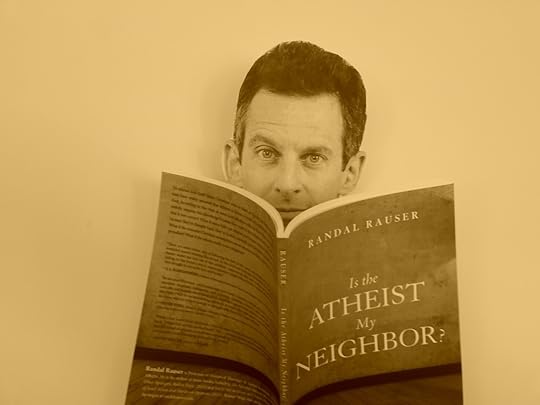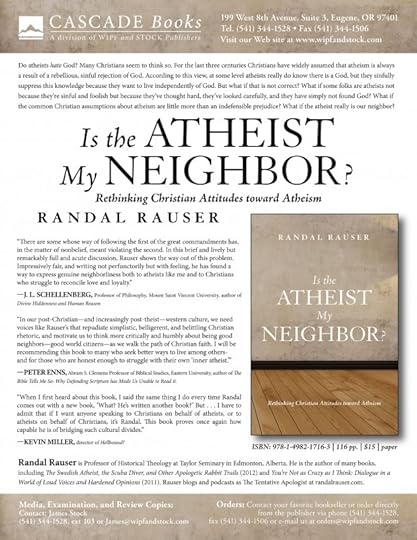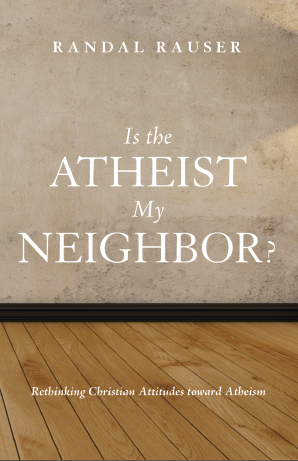Randal Rauser's Blog, page 180
June 16, 2015
Remaining a Christian doesn’t make you stupid any more than becoming an atheist makes you smart
Over the years I have engaged in countless conversations with folks from the skeptic/atheist community . In those conversations, I have often encountered a popular idea which goes something like this. “Christians,” it is said, “grew up in the church and so they’ve never thoughtfully stepped out of their worldview to question their beliefs. But many of us atheists grew up in the church and had to go through a painful and difficult process of questioning and reflection until we eventually walked away from the faith and became atheists.”
The underlying idea seems to be something like this: atheists have subjected their beliefs to critical thinking and the cool light of reason. But Christians remain locked within the beliefs of their youth.
There are several problems with this popular analysis.
To begin with. the mere fact that you changed your worldview at some point in time doesn’t automatically entail that you did so for good reasons. For example, in many instances I have heard atheists share as part of their story particular injustices they suffered in the church. Were those injustices a catalyst for their deconversion? And did they confabulate justifications for their decision after the fact to justify it? We cannot exclude these possibilities a priori and we should always have a healthy skepticism about any personal narrative of conversion (either to Christianity or away from it) which purports to have proceeded on the cool evaluation of evidence and argument alone.
Second, this simplistic opposition that equates rationality with the change of belief is far too crude. Consider a couple examples. To begin with, we have Dave, a fundamentalist Christian who believed all atheists were idiots. Then Dave had a falling out with his church after which he became an atheist who believed all Christians are idiots. In each case, Dave has been firm and unyielding in his belief. He is as certain now that all Christians are fools as he was once persuaded that all atheists are fools.
On the other hand, we have Debbie. Raised a fundamentalist Christian, Debbie has carefully reflected on her beliefs over the years and as a result has repeatedly nuanced, qualified and adjusted her beliefs. Whereas she was once a convinced young earth creationist, Debbie is now a tentative theistic evolutionist. While she once endorsed an absolute inerrancy in all affirmations in the Bible, she now has a carefully nuanced conception of scripture as divinely appropriated human speech written in various genres. Whereas she was once convinced that everybody outside her Baptist sect were not saved, now she is a hopeful inclusivist who believes God’s grace and mercy can appear in all sorts of surprising ways.
The popular atheist idea would suggest that Dave is the serious thinker because he switched from Christianity to atheism. Debbie, meanwhile, is not a serious thinker because she has remained a Christian throughout her life. But that analysis has things quite wrong. If anything, Dave is the unthinking dogmatist who simply brought his fundamentalism with him when he left the church. Debbie, by contrast, has continued to think, nuancing and qualifying her beliefs with each passing year.
This leads me to the final point. The popular idea just assumes that anybody who remains a Christian does so in bad faith, i.e. without having seriously countenanced the evidence. But this merely begs the question against the theist. The fact is, rather, that many people retain their beliefs precisely because they have good ground or reasons to do so.
June 15, 2015
Reductionism Propaganda? On the wily ways of the open-minded dogmatist
One of my readers, Mark, forwarded this short video “What is life? Is death real?” and asked for my comment. It’s well worth your time to invest the five minutes to watch it:
This is a slickly produced video with a lot of good information. But it is not simply a neutral recounting of the facts. You can say human beings are made of carbon or you can say they are made of star dust. Both descriptions are accurate but neither is neutral. Each is likely to invoke additional implied meaning in the listener, and depending on what additional meaning (aka implicature) the speaker wants to convey, he will choose one or the other.
Mark commented in his email that the video seems to convey a “hard materialism”. Hard materialism is a philosophical interpretation of scientific data, and Mark is right to find more than a whiff of it here. However, it seems to me that there is an even deeper commitment here to monistic reductionism, that is, the belief that all the diverse aspects of reality from quarks to consciousness, can be reduced to a single explanatory account subject to the same laws. Ancient Greek philosopher Democritus defended atomism, the claim that everything in reality reduces to atoms in a void. Democritus’s view was materialistic, but it was also committed to monistic reductionism. The narrator in this video is clearly partial to materialism, but his deeper commitment appears to be to monistic reductionism. (I’ll return to unpack that point later.)
As a result, the narrator strongly rejects any claim that there may be ontologically distinct spheres in the created world such as matter and spirit. At 4:08 he states his philosophical position quite baldly:
“One thing is for sure. The idea that life is fundamentally different from non-living things because they contain some non-physical element or are governed by different principles than inanimate objects turns out to be wrong.”
In this excerpt the narrator endorses both materialism coupled with monistic reductionism. Moreover, he launches a tendentious rhetorical broadside at those who reject this materialistic reductionism by labelling it “magic” as you can see in this accompanying screenshot:
Sadly, it is very common these days to find materialists and reductionists attempting to win the debate by way of this tendentious use of labels in which all those who disagree with them espouse “magic”.
The truth is that this is nothing more than philosophical dogmatism. The narrator thinks the notion that persons are not reducible to fluorine, sodium phosphorus, oxygen (etc.) is “magic”. But from the perspective of the non-reductionist, the situation is quite the opposite: it is the very attempt to reduce persons to chemical composition (or matter in motion or whatever) that constitutes “magic”. Since the term conveys nothing of substance beyond “That view looks ridiculous to me so I’ll label it accordingly!” it’s probably best for all parties to refrain from rhetorical slights like the “magic” label.
Perhaps it is worthwhile to say a bit more about why the non-reductionist finds the reductionist’s program so implausible. One of the most familiar aspects of the universe is the fact that different levels of complexity give rise to different laws and rules of explanation. The physicist’s explanations are different from the chemist’s which are different from the biologist’s which are different from the psychologist’s which are different from the sociologist’s which are different from the ethicist’s. The fallacious attempt to derive an ought from an is may be the most well known defeater for the reductionist’s program, but it certainly isn’t the only one.
As for the reductionist, he remains committed to the program that every level of explanation reduces to the same laws: one ring to rule them all. The reductionist is free to have that assumption and promote that philosophical agenda as the narrator does in this video. The problem comes when you attempt to present your philosophical interpretation of the data as if it were itself the data whilst labelling competing philosophical interpretations as magic.
With that in mind, let’s return to the narrator’s statement at 4:08 adding the appropriate qualification to make it more accurate:
“One thing is for sure. The idea that life is fundamentally different from non-living things because they contain some non-physical element or are governed by different principles than inanimate objects is incompatible with my reductionist philosophy and so I’m going to declare without argument that it turns out to be wrong.”
This reminds me of the work of Donald Mackay. Mackay was a professor of neuroscience at the University of Keele throughout the 1960s and 1970s. He was also a Christian and he wrote several books critiquing what he called the “nothing buttery” of his materialist and reductionist colleagues, folks who relished telling the story of carbon rather than stardust while editorializing with a “nothing but” as if theirs were simply the story of science itself. But make no mistake, “nothing but” is a philosophical judgment as surely as “something more”.
The narrator’s rhetorical coup de grace comes at the end of the video when he makes following declaration:
“Don’t look at us. We don’t have any answers for you. Just questions to think about.”
This quip reminds me of theologian Gordon Lewis’s book Decide for Yourself: A Theological Workbook which purports to be a neutral introduction to Christian doctrine that allows each reader to “decide for themselves” what they will believe. The only problem is that each chapter decides what doctrine will be discussed, the range of biblical texts relevant to the formulation of that doctrine, and the set of questions you are supposed to ask of those biblical texts. The result is that a supposedly neutral introduction to doctrine is in fact illusory: you are being directed how to think throughout the process. Similarly, this video purports to be only a neutral inquiry that asks questions: but throughout the narrator decides for you the range of legitimate and illegitimate (i.e. magical) answers. In short, this video is little more than materialist and monist reductionist propaganda.
Before we wrap up, let’s return to my claim that the deeper commitment is to monistic reductionism rather than materialism. Why do I say that? The key comes at 4:53:
“And here’s another question for you. If everything in the universe is made of the same stuff, does this mean everything in the universe is dead or that everything in the universe is alive?”
As the narrator poses this extraordinary question, a little sign pops up on the bottom of the screen which states: “Leaving Science. Entering philosophy”. Oh, so now we’re entering philosophy? That made me laugh out loud since the entire video is couched in deeply philosophical categories from start to finish. As with the rhetoric about magic and only asking questions, this is yet another strategy of propaganda, one which tacitly underscores for the viewer the tendentious claim that everything which came before 4:53 is nothing but neutral scientific description.
This final question is also revealing for illustrating the deeper commitment to monistic reductionism. Everything in the narrator’s view must ultimately reduce to one type of explanation and one set of laws. There cannot ultimately be fundamentally different types of things or different sets of laws. So long as you are a reductionist you are okay in the narrator’s view.
This even includes, apparently, the view that “everything in the universe is alive”. What’s that supposed to mean? Apparently the narrator is giving a nod here to a philosophical position like panpsychism or, as Galen Strawson prefers to call it, panexperientialism, according to which fundamental units of matter — perhaps quarks or electrons — are themselves subjects of experience which, when they create aggregates like human beings or whales or dogs, create other subjects of experience. In other words, it could be that everything is mind, or a subject of experience, or alive. Apparently that’s okay, but a view like substance dualism is “magic”.
Perhaps the best comeback to this video is found in an old book written by theologian Emil Brunner way back in 1936. So I’ll let Brunner have the last word:
“One can, for example, say that man is a chemical mixture of lime, phosphorus, and nitrogen. The Bible says it more simply—man is dust. That is true, but there are other judgments. One can say, man is a machine, or rather factory with an enormous number of complicated machines, the stomach for example, a combustion machine. This is not untrue either, but it is not everything that can be said. One can say that man is an animal, and who would contest the many similarities which we have in common! […]
“Yet men have always somehow known that man is more than animal, and it is indeed a peculiar kind of scientific method which can no longer see the differences that separate man and beast and machine.” (Our Faith, trans. John Rilling (London: SCM Press, 1936), 37.)
June 14, 2015
Was the Bible written by God or men? And other false dichotomies
This morning I read an article by Shulem Deen titled “This is how I lost my faith: Science helped, yes — but finally I accepted the holy texts were written by man.” Deen is writing about the Hebrew Bible, but his observations would apply equally well to the Christian Bible. He begins by noting the corrosive impact that science had on his Jewish faith. Next, he observes,
“Nothing, however, had a more shattering impact on my faith than the realization that, stripped of religious exegesis, our primary religious text, the Hebrew Bible, had the markings of human rather than divine authorship; it was beautiful, intricate, layered in poetry and metaphor and heart-stopping drama, but human nonetheless.”
The false dichotomy assumed in this passage — either God or human beings — is maddening, but alas it is also all-too-common. Indeed, I frequently detect this same false dichotomy underlying atheist/agnostic/skeptic critiques of the Bible. One assumes that either the Bible is all divine or it’s all human. A decade ago Peter Enns provided an excellent critique of that false dichotomy in Inspiration and Incarnation, a book which is being released in a second edition in September. Yoram Hazony provides another great critique in The Philosophy of Hebrew Scripture (which I review here).
Despite the fact that mainstream Christian and Jewish scholars like Enns and Hazony offer thoughtful and sophisticated critiques of Deen’s simplistic dichotomy, I have noticed that many in the atheist/agnostic/skeptic community prefer to perpetuate the dichotomy. In some cases this may be because the only expression of Christianity or Judaism with which these atheists, agnostics or skeptics are familiar is a fundamentalism that perpetuates the dichotomy. But in other cases I have noticed that they are aware of these mainstream rejections of the dichotomy and they simply choose not to engage them. Alas, this reduces their critique of the Bible to nothing more than a disingenuous knocking over of the fundamentalist strawman.
Now I will direct my comments to those atheists, agnostics and skeptics who continue to critique the Bible based on the fundamentalist false dichotomy even as they know that there are far more sophisticated, defensible (and I would argue orthodox) conceptions on offer such as those of Enns and Hazony. Let’s put it in perspective by considering another false dichotomy, in this case one that works against the atheist.
So here’s the scenario. Imagine an atheist who converts to Christianity and then describes his conversion as being driven by a rejection of what he sees to be the nihilistic implications of atheism:
“Nothing, however, had a more shattering impact on my atheism than the realization that, stripped of all the rhetoric about a scientific worldview and liberation from the chains of religion, atheism had the markings of nihilism rather than meaning; it sounded bold, courageous, and appropriately scientific, but it was nihilism nonetheless.”
There are atheists who would accept this dichotomy. That is, they would agree that if there is no God then the truth of nihilism follows ineluctably. Indeed, this scenario comports well with J. Budziszewski’s conversion to Christianity as outlined in his essay “Escape from Nihilism.” It’s a very interesting, well written and thoughtful essay and Budziszewski makes many salient points. But it seems to me that it nonetheless assumes a false dichotomy. And many atheists would agree that this is a false dichotomy. They would insist that it is possible to develop non-theistic conceptions of meaning. Moreover, these atheists would resent Christians (or Jews) limiting their critique of atheism to those forms that assume a nihilistic entailment.
This would be an understandable objection. If Christians recognize that there are forms of atheism that reject the dichotomy then they have a responsibility to engage with those forms. Mutatis mutandis for the atheist/agnostic/skeptic who recognizes that there are Christians (or Jews) who rejects Deen’s “God or man” dichotomy as false. Consequently, the atheist/agnostic/skeptic who wants to engage with the most defensible views of biblical revelation should engage with those scholars who repudiate that false dichotomy.
June 12, 2015
Buy the book all the smart and cool atheists are reading!
What can I say? My new book is already getting a lot of interest! So join the cool kids and pick up your copy of Is the Atheist My Neighbor?
June 11, 2015
74. The Problem with Jebus
One of the oft-noted traits of the New Atheism is a new hostility and contempt toward those of differing opinion. In this episode of The Tentative Apologist Podcast I address this troubling trait with respect to the specific convention of referring to Jesus Christ as “Jebus”.
I begin by tracing the origins of this convention. Next, I note of the current contempt that seems to drive the usage of this “Jebus meme”. Finally, I consider the deeply negative impact it has on the pursuit of meaningful discourse across the ideological aisle. Folks who use such demeaning and inflammatory rhetoric may purport to value the open society, but their counterproductive incivility only works to undermine it.
June 10, 2015
My new book on atheism is already bringing Christians and atheists together
The picture speaks for itself. Here I am hanging out with my main man, Richard Dawkins. Apparently he loves my new book Is the Atheist My Neighbor? although he still thinks I’m a “faithhead”. Oh well, you can’t win ’em all!
Is the Atheist My Neighbor? The Promo Flyer
June 9, 2015
Is the Atheist My Neighbor? Support the Book and Change the Conversation
Many Christians seem to think so. For the last three centuries Christians have widely assumed that atheism is always a result of a rebellious, sinful rejection of God. According to this view, at some level atheists really do know there is a God, but they sinfully suppress this knowledge because they want to live independently of God.
But what if that is not correct? What if some folks are atheists not because they’re sinful and foolish but because they’ve thought hard, they’ve looked carefully, and they have simply not found God? What if the common Christian assumptions about atheism are little more than an indefensible prejudice? What if the atheist really is our neighbor?
In my new book Is the Atheist My Neighbor? Rethinking Christian attitudes toward atheism I challenge Christians to rethink their attitude toward atheism and doubt in general.
Here are three endorsements for the book:
J.L. Schellenberg, Professor of Philosophy, Mount Saint Vincent University
“There are some whose way of following the first of the great commandments has, in the matter of nonbelief, meant violating the second. In this brief and lively but remarkably full and acute discussion, Rauser shows the way out of this problem. Impressively fair, and writing not perfunctorily but with feeling, he has found a way to express genuine neighborliness both to atheists like me and to Christians who struggle to reconcile love and loyalty.”
Peter Enns, Abram S. Clemens Professor of Biblical Studies, Eastern University
“In our post-Christian–and increasingly post-theist–western culture, we need voices like Rauser’s that repudiate simplistic, belligerent, and belittling Christian rhetoric, and motivate us to think more critically and humbly about being good neighbors–good world citizens–as we walk the path of Christian faith. I will be recommending this book to many who seek better ways to live among others–and for those who are honest enough to struggle with their own ‘inner atheist.'”
Kevin Miller, Director of “Hellbound?”
“When I first heard about this book, I said the same thing I do every time Randal comes out with a new book, ‘What? He’s written another book?’ But . . . I have to admit that if I want anyone speaking to Christians on behalf of atheists, or to atheists on behalf of Christians, it’s Randal. This book proves once again how capable he is of bridging such cultural divides.”
How you can support this book.
If any of this resonates with you, I hope you will consider supporting Is the Atheist My Neighbor? There are four ways you can do this.
First, you can buy the book (but you probably figured that one out already). At present it is in stock for $12 at Wipf and Stock: http://wipfandstock.com/is-the-atheist-my-neighbor.html. It will be in stock at Amazon and other booksellers shortly.
Second, you can request that your local public or university library purchase the book.
Third, you can tell others about it through whatever means you have available: Facebook, Twitter, Instagram, telephone, telegraph, telepathy, not to mention good old word of mouth. Whatever social media you regularly use, please take advantage of it to let others know about Is the Atheist My Neighbor?
Finally, you can review the book at www.amazon.com and other booksellers, at www.goodreads.com, and on your blog.
This isn’t just about selling a book: it’s about changing attitudes and encouraging mutual understanding across deep divides. With more than 300,000 new book titles published every year, the only way this book will find its audience is if people get behind it.
Thanks for your support.
Randal Rauser
June 8, 2015
My abortive Nuskeptix conversation with atheist Raphael Lataster
On Saturday, June 6th, I appeared as a guest on the YouTube channel Nuskeptix to have a discussion with atheist Raphael Lataster on the topic “The Existence Of God and The Exclusive Truth Of Christianity.” (That was certainly not my chosen title as I make clear in at the beginning of the video.) Lataster is the author of the popular book There was no Jesus, There is no God which was based on his Master’s Thesis.
I had heard of Lataster and his book prior to agreeing to participate in this event, but I had no familiarity with his work or his presentation style. So one afternoon last week I set aside a couple hours to listen to a couple interviews he’d given and to watch the video of one of his presentations on YouTube. It was not long before I was reconsidering the wisdom of engaging with Lataster as an interlocutor.
Throughout the interviews I sampled I found Lataster to be abrasive and extremely condescending and dismissive toward those he disagrees with. For example, in his Skepticality interview the interviewer asks Lataster, who defends a version of Jesus mythicism, why so many biblical scholars and ancient historians (even religious skeptics like Bart Ehrman!) discount mythicism and accept that Jesus was a historical person. This is a crucial question and one would expect a reasonable person, even one taking a fringe view like Jesus mythicism, at least to concede that the consensus opinion is informed by reason and evidence. But Lataster doesn’t concede this, and instead he opts to attribute the consensus opinion to “dogma” driven by various possible ignoble motivations. Here’s how he puts it:
“In general, there is a great reluctance to accept the idea that there was no historical Jesus. It’s very well accepted within scholarship, even biblical scholarship, that the Jesus of the Bible [aka the Christ of faith] is a myth. […] But even those like Bart Ehrman, even those who are atheists, and reject the biblical Jesus, quite a lot of them actually accept and, I think dogmatically assert, that there definitely was a historical Jesus behind it all. And there’s many reasons for that. It could, it could have to do with ego, it could have to do with finances. But it’s very important to them that Jesus did exist as a human being.” (51:00)
Pause for a moment to take in the extraordinary hubris of that statement. Rather than acknowledge that a world-class scholar like Bart Ehrman has reasons for accepting the historicity of Jesus, Lataster claims that Ehrman’s belief (and that of all other scholars in this consensus) is merely a dogma, one which could be driven by various factors like personal ego or “finances” (e.g. research funding).
Though the podcast is called “Skepticality”, the interviewer expresses no reservations when Lataster dismisses the opinion of the vast majority of biblical scholars and ancient historians as “dogmatism” driven by self interest. (Unfortunately, this didn’t surprise me as I have often noticed that self-described skeptics who typically express great skepticism about fringe positions seem to table that skepticism when the fringe position suits their personal interests. Yes, the confirmation bias is alive and well in the “skeptic” community.)
To make matters worse, Lataster talks out of both sides of his mouth. While he suggests that scholars who accept a historical Jesus are driven by dogmatism, in the interview he states that he does not assume a burden of proof in his book to establish that Jesus didn’t exist (42:42). Instead, he’s only defending Jesus mythicism as a reasonable possibility. But if that’s all he’s saying then why does he claim that those who reject Jesus mythicism are driven by “dogma”? And why did he title his book There was No Jesus, There is No God if he’s only aiming to establish that it is possible to be rational and believe that there was no Jesus?
Suffice it to say, after listening to Lataster, I had serious reservations about appearing with him on Nuskeptix. His behavior was textbook fundamentalism: adopt a sharp in-group/out-group binary opposition and marginalize those in your chosen out-group by imputing to them moral and/or cognitive defects (e.g. ignorance, dogma, ego, financial motivations). Meanwhile, present yourself and your in-group as the sole intellectually credible defenders of the truth.
Despite serious misgivings, I had made a commitment to Nuskeptix to appear and so I went ahead with the show in the hope that we might be able to have a discussion of opposing worldviews. In his previous interviews Lataster had expressed his great sympathy with pantheism in particular, though he did so on grounds that seemed to me to be very weak. He had also claimed that the term atheism does not commit one to belief in the non-existence of God despite the fact that this is the standard definition in authoritative sources like the Encyclopedia of Philosophy, the Cambridge Dictionary of Philosophy, and common dictionaries. Consequently, I was anxious to hear more from Lataster about his idiosyncratic views and his reasons for holding them.
No such luck. I quickly learned that Lataster had no interest in a conversation framed on a charitable exchange of views. Rather, he demanded that I provide him with evidence of the Christian God that he would find persuasive. At the same time, he refused to share anything of his own views. This behavior reminded me of creationist Kent Hovind’s infamous claim to offer $250,000 to anybody who would provide him with evidence for evolution that he would accept. (No surprise, he never had to pay out!)
The contrast between this exchange and my recent evening of conversation with Justin Schieber could not be greater. I don’t know that the resulting exchange was particularly illuminating, and the middling sound quality at points didn’t help matters. Nonetheless I am grateful to Nuskeptix for the invite, though in the future I will make sure to limit my appearances to those who really are interested in a conversation.
June 6, 2015
Animal Resurrection
Philosopher Dale Tuggy of the “Trinities” podcast recently posted a two-part podcast interview with Trent Dougherty on the problem of evil and animal suffering. (Part 1; Part 2). The second podcast focuses on Dougherty’s recently published book The Problem of Animal Pain: A Theodicy For All Creatures Great And Small. In the book Dougherty argues that God will resurrect animals that suffer. Tuggy cites the following passage from the book in the write-up accompanying the podcast:
“I will defend the thesis that a class of animals… will not only be resurrected… but will be deified in much the same way that humans will be. …they will become full-fledged persons… who can look back on their lives… then they will accept, though with no loss of the sense of the gravity of their suffering. that they were an important part of something infinitely valuable, and that in addition to being justly, lavishly rewarded for it, they will embrace their role in creation. In this embrace, evil is defeated.” (p. 3)
A few years ago I was driving my daughter to school when we drove past a bloody rabbit that was thrashing about on a front lawn. A man was holding back his barking Rottweiler a few feet away. It wasn’t hard to figure out that the Rottweiler had captured the rabbit and managed to inflict a mortal wound before the owner got it back on leash and under control. Now the rabbit was dying in agony on the front lawn. The barest glimpse of the vast suffering of animal creation had entered suburbia.
According to Dougherty’s thesis, we can analyze this problematic instance of suffering by concluding that God will resurrect the rabbit in the future with changes in its cognitive ability that render it fit to understand the value of that past suffering and to accept that role.
Tuggy expresses some skepticism toward this proposal in the interview. One of the objections he raises is that the kind of adaptations required to appreciate one’s suffering would not be possible for some creatures to remain what they are. Here’s the relevant exchange (occurring around 22 minutes into the podcast):
Tuggy: “Most of us believe that there have to be something like essences, that just simply for the fact that not anything can change into anything else. So I could turn into a taller guy or a shorter guy, maybe I could be transformed into a woman. But anyway, It seems like those things are possible but you know most of us would want to say that even God couldn’t turn a potato into, I don’t know, an angel or a human. I mean, he could annihilate a potato and then create a human right on the same spot, but … the human that came into existence wouldn’t be a former potato.”
Dougherty: “Mr. Potato-head is a possible counterexample to your theory there Dale.”
Tuggy: “He’s not a potato either. He only looks like one.”
After this initial humorous rejoinder, Dougherty offers a serious reply. If an angel’s only experience with human beings were limited to the embryonic stage, the angel might well consider it impossible that God should resurrect human beings that are capable of reason and imagination.
If we accept Dougherty’s view of animal resurrection then our current experience with non-human animals could be at something akin to an embryonic state of existence in which case a resurrected rabbit could come to accept his past role in a broken creation — including his untimely demise on that front lawn — even as he enjoys a resurrected life of rational existence like the anthropomorphized creatures of Richard Adams’ Watership Down.












